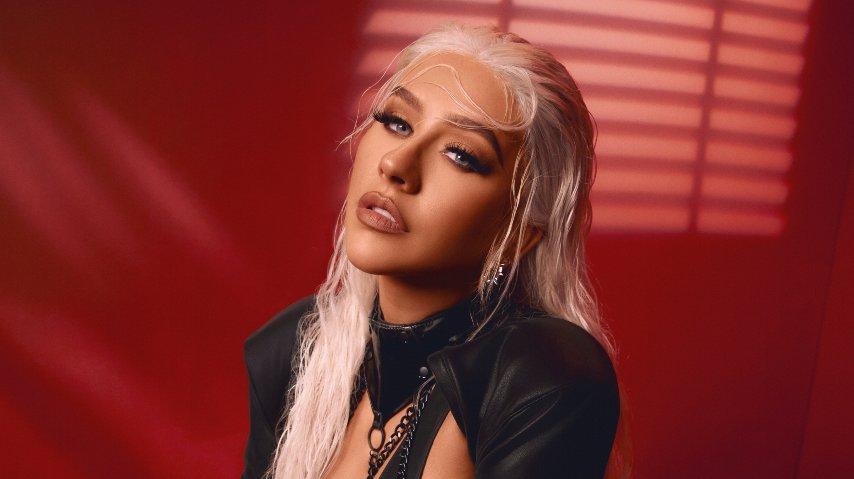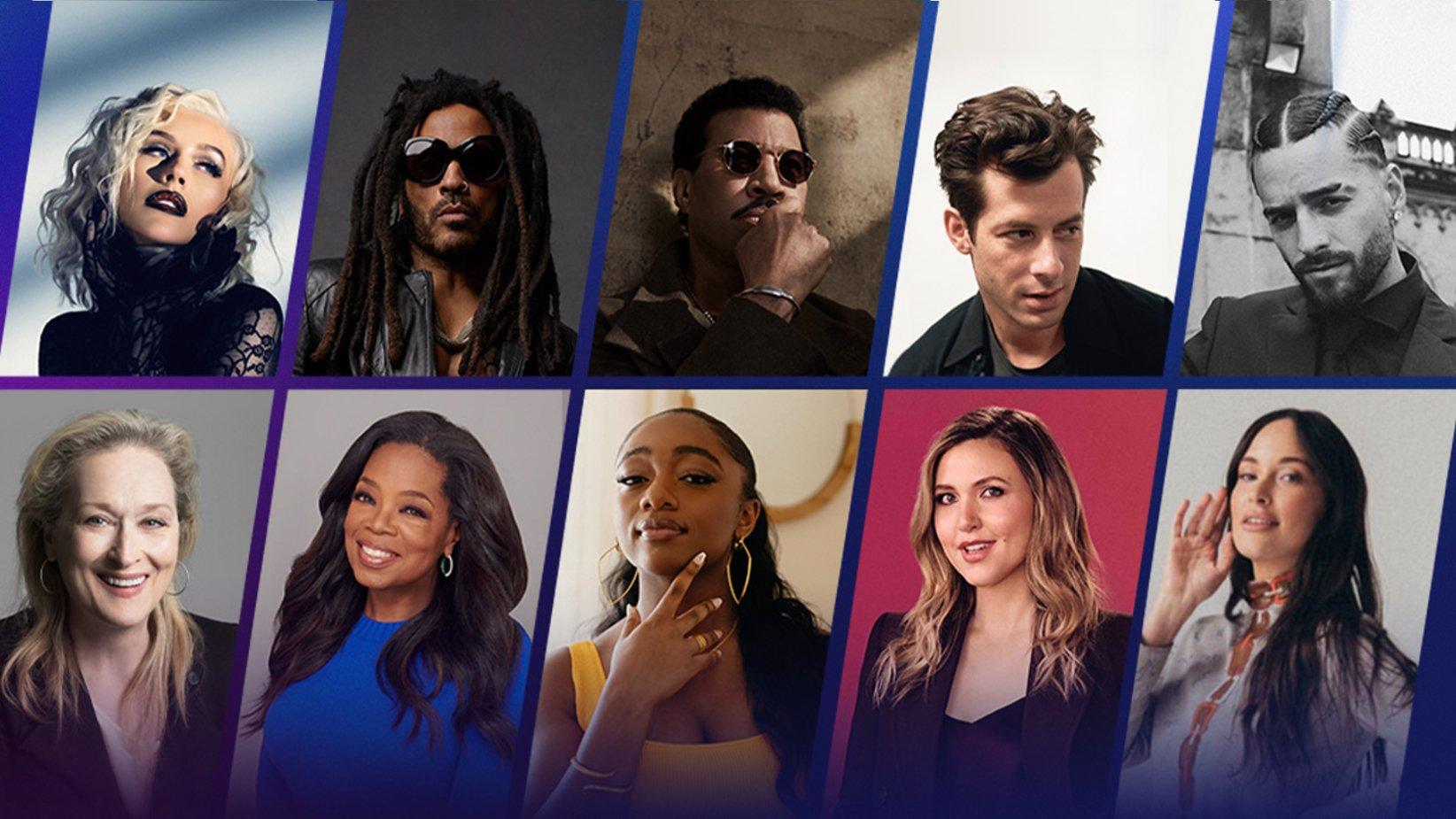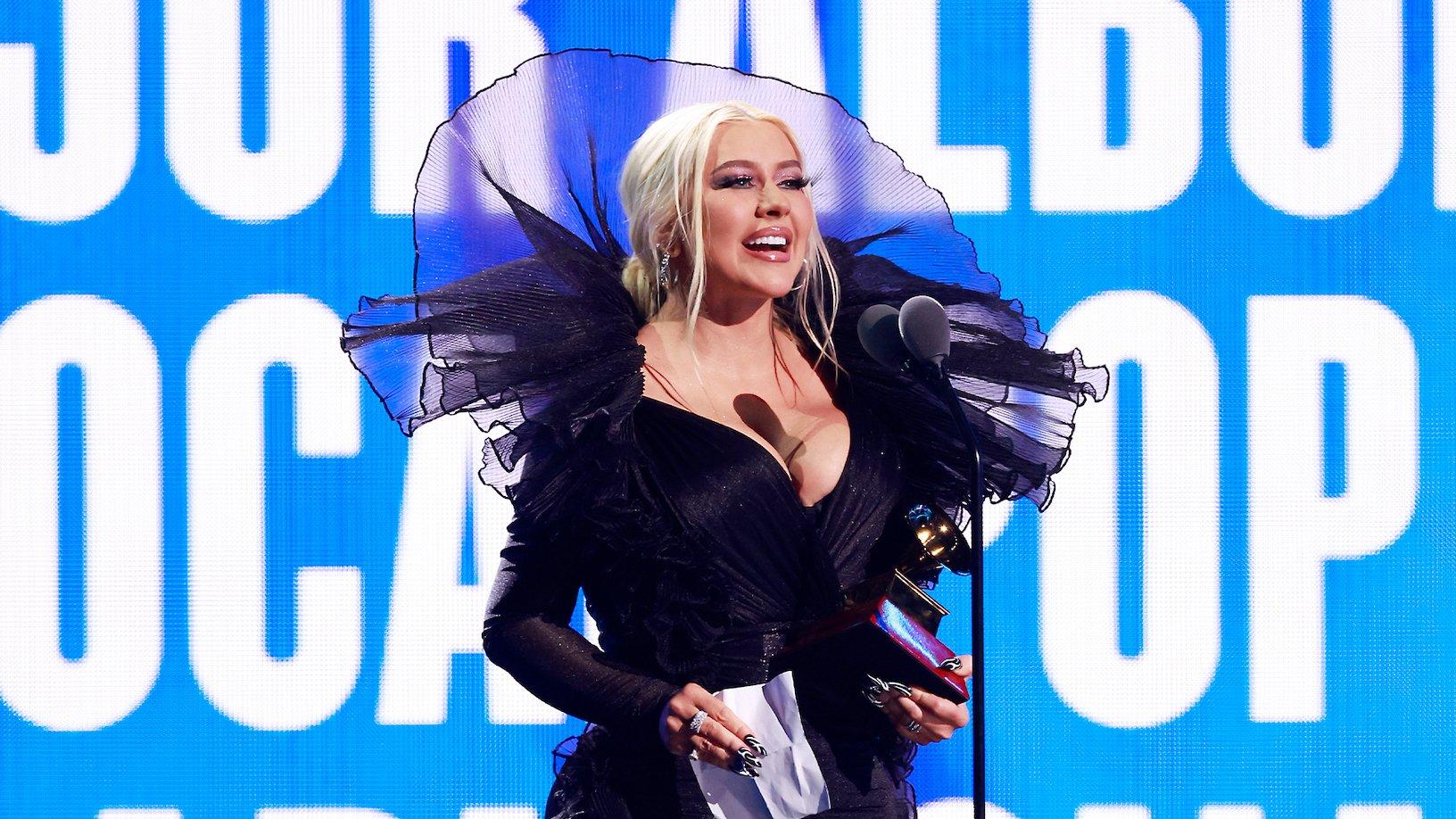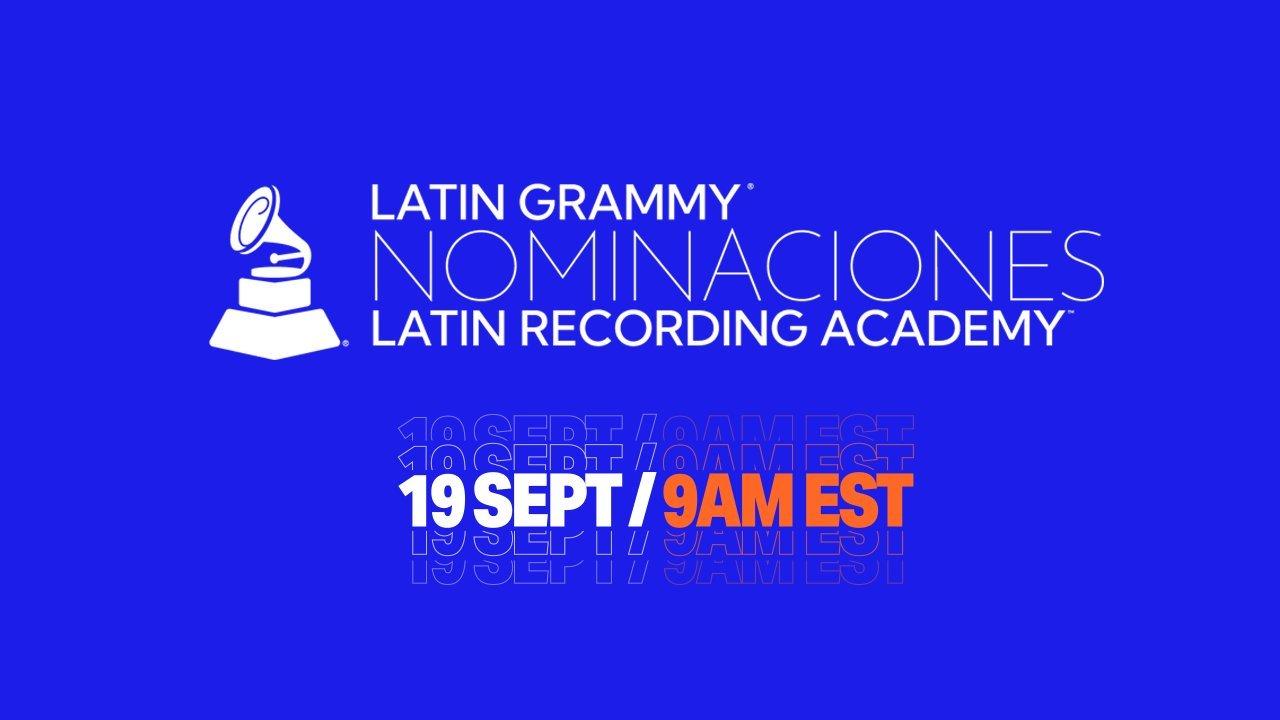Photo courtesy of the artist

news
2022 Latin GRAMMYs: Christina Aguilera, Camilo, Elvis Costello, Jorge Drexler & More Announced As Performers
They join previously announced artists from Ángela Aguilar to Rauw Alejandro to Jesse & Joy — as well as the 2022 Latin Recording Academy Person of the Year, Marco Antonio Solís.
The 2022 Latin GRAMMYs already promised to be a night of stunning music to remember — and now, they've upped the ante.
Today, the Latin Recording Academy announced additional performers for the 2022 Latin GRAMMYs, officially known as the 23rd Latin GRAMMY Awards, which includes current nominees and past Latin GRAMMY and GRAMMY winners like Christina Aguilera, Camilo, Elvis Costello, Jorge Drexler, John Legend, Mariachi Sol de México de José Hernández, and Christian Nodal.
Latin GRAMMY winner and five-time GRAMMY winner Christina Aguilera is currently nominated in seven categories including Album Of The Year and Record Of The Year; five-time Latin GRAMMY winner Camilo currently boasts six nominations including Record of the Year and Song of the Year; seven-time Latin GRAMMY winner and five-time GRAMMY nominee Jorge Drexler currently boasts eight nominations including Album of the Year and Record of the Year; and four-time Latin GRAMMY winner Christian Nodal is nominated for Best Ranchero/Mariachi Album and Best Regional Song.
Read More: 2022 Latin GRAMMYs Nominees Announced: See The Complete List
They join the previously announced artists Ángela Aguilar, Rauw Alejandro, Marc Anthony, Banda Los Recoditos, Chiquis, Nicky Jam, Jesse & Joy, Carin León, Sin Bandera, Sebastián Yatra, and the 2022 Latin Recording Academy Person of the Year, Marco Antonio Solís.
The 2022 Latin GRAMMYs promise to honor the legacy, celebrate the present, and embrace the future of Latin music with a deliberate consciousness that pays it forward to the next generations of music creators.
The 2022 Latin GRAMMYs will air on Univision on Thursday, Nov. 17, at 8 p.m. ET/PT (7 p.m. CT). Additional international broadcasting partners will be announced at a later date. The Latin GRAMMY Premiere, where the majority of the categories are awarded, will precede the telecast; additional details will be announced at a later date.
Mark your calendars now, and get ready for even more unforgettable sounds from Latin America and beyond!
2022 Latin GRAMMYs Hosts Announced: Luis Fonsi, Laura Pausini, Thalía & More

Photos courtesy of the artists
news
2024 GRAMMYs Presenters Announced: Christina Aguilera, Oprah Winfrey, Meryl Streep, Kacey Musgraves, Maluma, Taylor Tomlinson & More
Additional presenters for the 2024 GRAMMYs include Lenny Kravitz, Lionel Richie, Mark Ronson, and Samara Joy. The 2024 GRAMMYs will broadcast live from Crypto.com Arena in Los Angeles on Sunday, Feb. 4.
Updated Friday, Feb. 2, to add Kacey Musgraves as a presenter.
Presenters for the 2024 GRAMMYs have been announced: Christina Aguilera, Lenny Kravitz, Lionel Richie, Mark Ronson, Maluma, Kacey Musgraves, Meryl Streep, Samara Joy, Taylor Tomlinson, and Oprah Winfrey are all confirmed to take the GRAMMY stage on Music's Biggest Night this weekend, Sunday, Feb. 4. Of course, it wouldn't be a proper GRAMMY night without a few surprise guests, so make sure to tune in to find out who you'll see on GRAMMY Sunday.
In addition to the star-studded presenter lineup, the 2024 GRAMMYs will feature breathtaking performances from the leading artists in music today. Performers at the 2024 GRAMMYs include Billie Eilish, Billy Joel, Burna Boy, Dua Lipa, Joni Mitchell, Luke Combs, Olivia Rodrigo, SZA, Travis Scott, and U2. Several confirmed GRAMMY performers will make GRAMMY history at the 2024 GRAMMYs this weekend: Mitchell will make her GRAMMY performance debut, while U2 will deliver the first-ever broadcast performance from Sphere in Las Vegas. Additional performers will be announced in the coming days. See the full list of performers, presenters and host at the 2024 GRAMMYs to date.
Learn More: 2024 GRAMMY Nominations: See The Full Nominees List
2024 GRAMMYs: Explore More & Meet The Nominees
2024 GRAMMYs: See The Full Winners & Nominees List
How To Watch The 2024 GRAMMYs Live: GRAMMY Nominations, Performers, Air Date, Red Carpet, Streaming Channel & More
2024 GRAMMYs Performers: Burna Boy, Luke Combs And Travis Scott Announced
2024 GRAMMYs Performers: Billie Eilish, Dua Lipa, And Olivia Rodrigo Announced
Get The Full 2024 GRAMMYs Experience On Live.GRAMMY.com: Performances, Interviews, Red Carpet, Backstage & More
Here Are The Album Of The Year Nominees At The 2024 GRAMMYs
Here Are The Song Of The Year Nominees At The 2024 GRAMMYs
Get To Know The Best New Artist Nominees At The 2024 GRAMMYs
Here Are The Record Of The Year Nominees At The 2024 GRAMMYs
The 2024 GRAMMYs, officially known as the 66th GRAMMY Awards, will broadcast live from Crypto.com Arena in Los Angeles on Sunday, Feb. 4, at 8 p.m. ET/5 p.m. PT on the CBS Television Network and will be available to stream live and on demand on Paramount+.^ Prior to the Telecast, the 2024 GRAMMYs Premiere Ceremony will broadcast live from the Peacock Theater at 12:30 p.m. PT/3:30 p.m. ET and will be streamed live on live.GRAMMY.com. On GRAMMY Sunday, fans can access exclusive behind-the-scenes GRAMMY Awards content, including performances, acceptance speeches, interviews from the GRAMMY Live red-carpet special, and more via the Recording Academy's digital experience on live.GRAMMY.com.
Trevor Noah, the two-time GRAMMY-nominated comedian, actor, author, podcast host, and former "The Daily Show" host, returns to host the 2024 GRAMMYs for the fourth consecutive year; he is currently nominated at the 2024 GRAMMYs in the Best Comedy Album Category for his 2022 Netflix comedy special, I Wish You Would.
The 66th GRAMMY Awards are produced by Fulwell 73 Productions for the Recording Academy for the fourth consecutive year. Ben Winston, Raj Kapoor and Jesse Collins are executive producers.
^Paramount+ with SHOWTIME subscribers will have access to stream live via the live feed of their local CBS affiliate on the service, as well as on demand in the United States. Paramount+ Essential subscribers will not have the option to stream live but will have access to on-demand the day after the special airs in the U.S. only.
Stay tuned for more updates as we approach Music's Biggest Night!

Photo: Michael Tran/FilmMagic
video
GRAMMY Rewind: Christina Aguilera Celebrates Her Latin Heritage After Winning Her First Latin GRAMMY In 20 Years
In May 2022, Christina Aguilera made a stunning return to Latin music with ‘Aguilera.’ Six months later, she won her second Latin GRAMMY — and she made sure to thank everyone who was part of the journey.
Last year, pop diva Christina Aguilera returned to her Ecuadorian roots with Aguilera, her first full Spanish-language album since Mi Reflejo (2000). By the end of the year, she snagged multiple awards for the LP, including Best Traditional Pop Vocal Album at the 2022 Latin GRAMMY Awards.
In this episode of GRAMMY Rewind, revisit the moment Aguilera took the stage to accept her gramophone for her self-titled project.
"This is so important to me, and it's been amazing to come back to this home," Aguilera shared before expressing gratitude to her collaborators and longtime supporters.
"The fans, the Fighters, thank you so much!" She squealed. "We've been on this journey for so long, so I couldn't thank you more."
It was quite an eventful night for Aguilera. She received seven nominations in total — including Album Of The Year and Record and Song Of The Year for "Pa Mis Muchachas" — and delivered a show-stopping performance of "Cuando Me Dé la Gana" with Christian Nodal.
Press play on the video above to watch Christina Aguilera's complete acceptance speech for Best Traditional Pop Vocal Album at the 2022 Latin GRAMMYs, and check back to GRAMMY.com for more new episodes of GRAMMY Rewind.
10 Incredible Moments From The 2023 Latin GRAMMYs: Rosalía, Shakira, Peso Pluma & More

Photo: Jeff Kravitz/FilmMagic
video
GRAMMY Rewind: Kendrick Lamar Honors Hip-Hop's Greats While Accepting Best Rap Album GRAMMY For 'To Pimp a Butterfly' In 2016
Upon winning the GRAMMY for Best Rap Album for 'To Pimp a Butterfly,' Kendrick Lamar thanked those that helped him get to the stage, and the artists that blazed the trail for him.
Updated Friday Oct. 13, 2023 to include info about Kendrick Lamar's most recent GRAMMY wins, as of the 2023 GRAMMYs.
A GRAMMY veteran these days, Kendrick Lamar has won 17 GRAMMYs and has received 47 GRAMMY nominations overall. A sizable chunk of his trophies came from the 58th annual GRAMMY Awards in 2016, when he walked away with five — including his first-ever win in the Best Rap Album category.
This installment of GRAMMY Rewind turns back the clock to 2016, revisiting Lamar's acceptance speech upon winning Best Rap Album for To Pimp A Butterfly. Though Lamar was alone on stage, he made it clear that he wouldn't be at the top of his game without the help of a broad support system.
"First off, all glory to God, that's for sure," he said, kicking off a speech that went on to thank his parents, who he described as his "those who gave me the responsibility of knowing, of accepting the good with the bad."
Looking for more GRAMMYs news? The 2024 GRAMMY nominations are here!
He also extended his love and gratitude to his fiancée, Whitney Alford, and shouted out his Top Dawg Entertainment labelmates. Lamar specifically praised Top Dawg's CEO, Anthony Tiffith, for finding and developing raw talent that might not otherwise get the chance to pursue their musical dreams.
"We'd never forget that: Taking these kids out of the projects, out of Compton, and putting them right here on this stage, to be the best that they can be," Lamar — a Compton native himself — continued, leading into an impassioned conclusion spotlighting some of the cornerstone rap albums that came before To Pimp a Butterfly.
"Hip-hop. Ice Cube. This is for hip-hop," he said. "This is for Snoop Dogg, Doggystyle. This is for Illmatic, this is for Nas. We will live forever. Believe that."
To Pimp a Butterfly singles "Alright" and "These Walls" earned Lamar three more GRAMMYs that night, the former winning Best Rap Performance and Best Rap Song and the latter taking Best Rap/Sung Collaboration (the song features Bilal, Anna Wise and Thundercat). He also won Best Music Video for the remix of Taylor Swift's "Bad Blood."
Lamar has since won Best Rap Album two more times, taking home the golden gramophone in 2018 for his blockbuster LP DAMN., and in 2023 for his bold fifth album, Mr. Morale & the Big Steppers.
Watch Lamar's full acceptance speech above, and check back at GRAMMY.com every Friday for more GRAMMY Rewind episodes.
10 Essential Facts To Know About GRAMMY-Winning Rapper J. Cole

Image courtesy of the Latin Recording Academy
news
Rewatch The 2023 Latin GRAMMYs Nominations Livestream Now: See All The Nominees
Rewatch as Rosalía, Shakira, Jorge Drexler, Christian Nodal, Mon Laferte, and more of the biggest artists in Latin music announce the nominations for the 2023 Latin GRAMMYs. Get ready for the Biggest Night in Latin Music!
We’re officially gearing up for the Biggest Night in Latin Music, and the Latin Recording Academy has announced the nominations for the 2023 Latin GRAMMYs live from Seville, Spain.
If you missed the nominations livestream, you can rewatch the full nominations livestream below and watch as Rosalía, Shakira, Jorge Drexler, Christian Nodal, Mon Laferte, and more of the biggest artists in Latin music reveal the nominations for the 2023 Latin GRAMMYs.
Read More: 2023 Latin GRAMMYs: See The Complete Nominations List
The Latin GRAMMYs will return to our eyes and ears on Thursday, Nov. 16, from the Conference and Exhibition Centre (FIBES), in Seville, Spain. Officially known as the 24th Annual Latin GRAMMY Awards, the 2023 Latin GRAMMYs mark the first-ever international telecast in the history of the organization and awards.
The 2023 Latin GRAMMYs will debut several new Latin GRAMMY Award categories and a new field, including Best Songwriter Of The Year, Best Singer-Songwriter Song and Best Portuguese-Language Urban Performance.
Enjoy rewatching the nominations livestream announcement above, and keep checking GRAMMY.com for more information about the 2023 Latin GRAMMYs. We’ll see you on Nov. 16!
9 Facts About The Latin GRAMMYs: Location, History, Dates & More
